After years of remote work dominating the conversation, one thing is becoming clear: the return-to-office trend is quietly reshaping the Toronto real estate market — especially condos and rentals.
Read More2026 will be one of the largest mortgage renewal waves Canada has seen in years.
Thousands of owners who locked in ultra-low rates in 2020–2021 will be renewing into a very different interest rate environment.
Read MoreHeadlines are emotional. Data is rational.
And the people who build real wealth learn how to read the numbers without overreacting to the noise.
At Wealth Builders, we don’t make decisions based on fear or hype — we make them based on math.
Read MoreThe Greater Toronto Area (GTA) housing market continued to soften toward the end of 2025, with average and benchmark prices trending downward year-over-year. Transaction activity remains subdued as economic uncertainty and affordability challenges persist.
Read MoreIf you follow real estate or financial news, interest rates dominate the conversation. Every announcement triggers bold headlines, urgent predictions, and sweeping statements about what homeowners should do next.
Read MoreAs we step into 2026, real estate markets — especially in Toronto — look markedly different than in the recent past. Gone are the double-digit price increases and competitive bidding wars that defined much of the last decade. Instead, the market is entering a period of stability, adjustment, and opportunity — but only for those paying attention to the right metrics.
Read MoreLess Competition. More Negotiating Power.
January is often overlooked in real estate. After the holidays, many buyers pause their search, waiting for spring listings and warmer weather. But for informed and prepared buyers, January can be one of the most strategic times to buy.
Read MoreThe Toronto real estate market today is not defined by extremes. It is defined by realism.
Buyers are careful. Sellers must be strategic. Investors are thinking longer-term. This environment rewards those who understand the data, the timing, and the nuances of neighbourhood-level trends.
Read MoreThe most important lesson from 2025 isn’t about prices or rates—it’s about perspective.
Markets don’t move in straight lines, and headlines rarely tell the full story. If you want clarity, you need to look beyond the noise and understand how the data applies to your situation.
Read MoreAccording to the latest data from the Toronto Regional Real Estate Board (TRREB), the GTA housing market is showing a clear shift in dynamics. Some of the key take-aways.
Read MoreWhen most people think of the real estate market, the spring and fall seasons usually come to mind as the “prime” times to sell. But what about the holiday season? If you’re considering selling your Toronto home during the holidays, you may be surprised to learn that this window—though less crowded—can offer unique advantages for motivated sellers. With the right strategy, your listing can stand out and attract serious buyers eager to make a move before year-end.
Read MoreFor years, our philosophy has been simple: real estate is a long-term play—and every purchase is an investment. Seasonality in Toronto doesn’t change that truth; it amplifies it. Winter tends to bring fewer buyers and slower activity, which can create pockets of value for investors who know how to read the market and negotiate accordingly.
Read MoreDiscover why Toronto assignment sales in 2025 offer prime year-end opportunities for real estate investors. Learn how to secure discounted entry points, maximize rental potential, and build long-term wealth.
Read MoreToronto’s fall real estate market is often misunderstood. While spring typically gets the spotlight, fall can still offer strong opportunities for sellers—especially those who position their listings strategically. With average GTA home prices down around 5% year-over-year and condos averaging $651,000 in July 2025, sellers need to be mindful of today’s conditions. A slower, more balanced market means buyers have choices, and the best-prepared listings are the ones that generate multiple offers and strong final prices.
Read MoreToronto isn’t just Canada’s business capital—it’s one of North America’s biggest student hubs. Each September, tens of thousands of students return to the University of Toronto (UofT), Toronto Metropolitan University (TMU, formerly Ryerson), and York University, triggering a predictable leasing surge that smart investors can bank on.
Read MoreIn real estate, location has always been the cornerstone of value. In Toronto, location and transit access are practically synonymous. As the city grows denser and commuting becomes more challenging, properties with strong transit connectivity increasingly command a premium. The new TTC Line 5 Eglinton Crosstown LRT—a 19-kilometre light rail project set to reshape east-west transit across midtown Toronto—is one of the most significant infrastructure investments in the city’s history.
Read MoreToronto’s condo market has always been a barometer for the city’s real estate health. For first-time investors looking to enter the market, the question isn’t whether condos are a viable option—they are. The real question is where the best entry points are right now.
Read MoreCMHC projects a 2% home price drop in 2025 with recovery expected in 2026. Learn how affordability challenges in Canada, especially Toronto, shape long-term real estate strategies.
Read MoreWhen it comes to building wealth through real estate, long-term performance matters more than short-term fluctuations. Calgary, often seen as one of Canada’s most resilient and opportunity-rich housing markets, has shown consistent growth that continues to attract both local and out-of-province investors. Since 2005, Calgary’s real estate values have appreciated at a compound annual growth rate (CAGR) of approximately 5.1%—a powerful metric that reinforces the city’s stability and long-term wealth-building potential.
Read MoreOntario’s housing market is showing signs of stability, with the Sales-to-New-Listings Ratio (SNLR) hovering around 40.4%. For buyers, this is significant. It signals a balanced market—where neither buyers nor sellers hold a dominant advantage. In a landscape that has swung between overheated bidding wars and cautious slowdowns over the past few years, today’s balanced conditions open the door for strategic buyers ready to take advantage of this stability.
Read More






















